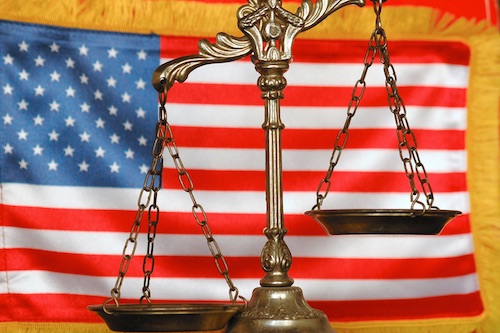“The American IDEA Act promises to take important steps to protect U.S. companies from foreign IP theft.”
Intellectual property (IP) theft has severe consequences for U.S. business, and many companies—particularly small businesses—can feel overwhelmed at the seemingly insurmountable task of stopping IP theft that occurs overseas. Introduced by Senators Tammy Baldwin (D-WI) and John Cornyn (R-TX) earlier this summer, the American IP Defense and Enforcement Advancement Act, or the “American IDEA Act,” promises to protect U.S. businesses against international IP theft. It is not to be confused with the Inventor Diversity for Economic Advancement (IDEA) Act, which aims to improve demographic data-gathering efforts at the U.S. Patent and Trademark Office (USPTO).
The bill, introduced on July 27, 2023, proposes to fund law enforcement agencies to improve IP enforcement, to direct studies on how to protect U.S. IP, and to support legal aid programs to assist small businesses in protecting their intellectual property. Additionally, the Act would strengthen existing laws, in part by reauthorizing certain provisions of the Prioritizing Resources and Organization for Intellectual Property Act of 2008 (“PRO-IP Act”) (15 U.S.C. §§ 8111-8116), which enhanced remedies for violations of intellectual property laws. The PRO-IP Act was also a bipartisan bill, and the American IDEA Act shows that IP protection continues to find support on both sides of the aisle.
Strengthening Current Agencies
The PRO-IP Act of 2008 established the Office of the Intellectual Property Coordinator (IPEC), a position to coordinate federal efforts against counterfeiting and IP infringement. IPEC is responsible for the coordination and development of a joint strategic plan against counterfeiting and infringement, which the American IDEA Act would expand to include actions specific to IP theft in certain priority countries. Specifically, the American IDEA Act would make explicit a requirement for the plan to address and include strategies to prevent the “unlawful taking or use of intellectual property from corporations and universities located in the United States, particularly by entities or individuals located in a priority watch list country.’’
Watch List Countries are designated every year in a special report by the U.S. Trade Representative (USTR) and identify the U.S. trading partners who present the most significant concerns regarding insufficient IP protection and enforcement. This year, the priority countries identified were Argentina, Chile, China, India, Indonesia, Russia, and Venezuela. The USTR considers new and evolving factors in creating its annual list. For instance, Belarus was added to the 2023 Watch List in response to a recent law there that legalized unlicensed use of certain copyrighted works if the right holder is from a foreign state “committing unfriendly actions,” which include sanctioning Belarus for its role in Russia’s unprovoked invasion of Ukraine. As multiple IP right holders discovered in the last year and a half, protections for brands from countries “unfriendly” to Russia have been met with disregard in that country, and the USTR now notes that this is likely to occur in Belarus as well.
In addition to targeting foreign countries in combating IP infringement, the American IDEA Act would also fund local law enforcement as part of an Intellectual Property Enforcement Program under 34 USCS § 30103. The program would allow the Department of Justice to offer grants to eligible state or local law enforcement entities “to aid in the training, prevention, enforcement, and prosecution of intellectual property theft and infringement crimes.” This would include facilitating coordination between state and local law enforcement officers and prosecutors and Federal law enforcement agencies in the enforcement of intellectual property laws.
Facilitating Pro-IP Studies and Programs
Beyond enhancing existing laws, the American IDEA Act would authorize two new Government Accountability Office (GAO) studies. One would assess how the Federal Government could better protect the intellectual property of manufacturers in priority watch list countries. The other would study whether the Federal Government could use diplomatic and trade channels to improve IP protections in watch list countries and evaluate how to better recover financial losses suffered by U.S. individuals and businesses resulting from a denial of adequate and effective IP protection in those countries.
Finally, the American IDEA Act would create a grant program specifically to fund legal aid programs to assist small businesses in protecting their intellectual property. The grant would make funds available to any American Bar Association-accredited law school, state bar association, or legal services organization providing no-cost or low-cost legal advice on the protection and enforcement of intellectual property rights to small businesses with an estimated annual revenue of not more than $150,000. The program would also fund the development and delivery of training programs and materials for small businesses relating to the protection and enforcement of intellectual property rights.
But Don’t Wait on Legislation
The American IDEA Act promises to take important steps to protect U.S. companies from foreign IP theft. However, even if the bill passes, it will take time to see what comes of the newly focused IPEC strategic plan, the local law enforcement initiatives, the GAO studies, or the new legal aid programs. For that reason, it is important for U.S. companies—and in particular small businesses—to know that they can take immediate steps today in order to be proactive about protecting their IP. These steps include registering their trademarks, copyrights, and patents both in the United States and overseas, recording their marks with U.S. Customs and Border Control to stop counterfeit imports, maintaining brand watches and monitoring services to detect infringing parties, and implementing robust measures to protect any trade secrets. By taking proactive measures to protect their IP, businesses can insulate themselves against the financial and reputational damage that can result from IP theft.
Image Source: Deposit Photos
Author: alexskopje
Image ID: 38432199

![[IPWatchdog Logo]](https://ipwatchdog.com/wp-content/themes/IPWatchdog%20-%202023/assets/images/temp/logo-small@2x.png)


![[Advertisement]](https://ipwatchdog.com/wp-content/uploads/2024/04/UnitedLex-May-2-2024-sidebar-700x500-1.jpg)
![[Advertisement]](https://ipwatchdog.com/wp-content/uploads/2024/04/Artificial-Intelligence-2024-REPLAY-sidebar-700x500-corrected.jpg)
![[Advertisement]](https://ipwatchdog.com/wp-content/uploads/2024/04/Patent-Litigation-Masters-2024-sidebar-700x500-1.jpg)

![[Advertisement]](https://ipwatchdog.com/wp-content/uploads/2021/12/WEBINAR-336-x-280-px.png)
![[Advertisement]](https://ipwatchdog.com/wp-content/uploads/2021/12/2021-Patent-Practice-on-Demand-recorded-Feb-2021-336-x-280.jpg)
![[Advertisement]](https://ipwatchdog.com/wp-content/uploads/2021/12/Ad-4-The-Invent-Patent-System™.png)






Join the Discussion
4 comments so far.
David Lewis
September 5, 2023 02:50 pmIt seems to me that the enforceability of a patent should not depend on the country from which the infringer originated. That just seems to lead to discrimination.
The extent to which IP enforceability differs by country, the differences should be targeted to the specifics of the national IP policies of that country that encourage infringement.
B
September 5, 2023 02:32 pm@ Anon, Anonymous
I was thinking the same. Small businesses are being killed because of the outrageously DISHONEST Federal Circuit and clueless S.Ct.
Meanwhile, there’s a reason Congress can’t cure this stupid patent eligibility b.s. because I could cure it in one minute.
Anon
September 5, 2023 09:52 amInteresting, albeit a ‘light’ article.
Bottom line current advice: do what one can already do.
Prospective review – I’d give it a B, but would have liked some analysis on what impact the prior law to-be-augmented has actually accomplished (there may be a reason why nothing is said, which does not bode well for doing more of that ilk).
Finally, if one really wants Congress to put a bite BACK into IP Protection laws, well, let’s of comments regularly appear including
A) resetting eligibility (without Trojan Horses),
B) restoring the proper role of the remedy of injunctions (as being the most perfect form of making an aggrieved whole, given the negative nature of a patent right),
C) employing jurisdiction stripping of the Supreme Court, taking the non-original jurisdiction of patent cases away from that body and giving it to a properly reformulated Article III court (resetting the CAFC, who have shown themselves to be nothing more than fire-hose trained simians in a cage). or even
D) embracing the “Public Franchise as form of Personal Property” that the Oil States (re)formulated and putting in some common sense FranchisOR-FranchisEE requirements on the US Government (for starters, reimbursement of enforcement costs and any loss of legitimate expected value of a granted patent).
As to Anonymous below, I concur (these are the types of entities that I have long decried as Efficient Infringers and large multi-nationals who enjoy TOO much power vis a vis equating corporations on equal footing as individuals (see the travesty of Citizens United)
Anonymous
September 4, 2023 09:31 pmAdd to the list of “priority watch list countries” Apple, Google, Intel, Microsoft, the Unified Patents cabal members, Facebook, and Amazon. Those companies infringe more than most of the countries of concern, with pockets just as deep. If you’re big enough, you steal, be it country or company because you feel invincible. If the IDEA Act is intended to help small businesses, Congress, please help them against even the worst domestic infringers, too.